Politics
Islamic State: Germany and Europe are once again a target
Published
8 months agoon
By
Ekwutos BlogThe attack in Solingen is just the latest example of a new wave of violence linked to the Islamic State terrorist group. Experts say the war in the Middle East is the main catalyst.

The deadly stabbings in Solingen have been claimed by the Islamic State (IS)
© Sascha Schuermann/Getty Images
The terrorist militia Islamic State (IS) has claimed responsibility for the knife attack in Solingen. According to Amak, the mouthpiece of IS, the attack was carried out in “revenge for Muslims in Palestine and elsewhere” and targeted a “group of Christians.”
“Extremists are using the ongoing conflict in the Middle East as a way to gain momentum,” Thomas Mücke told DW. He works for the Violence Prevention Network (VPN), an organization dedicated to preventing extremism and deradicalizing violent criminals. Since October 7, 2023, when Hamas killed scores of Israeli civilians and Israel responded with a counterattack in the Gaza Strip, Mücke has seen “a fourfold increase” in the number of attacks and attempted attacks in Western Europe in comparison to 2022.
The attack in Solingen was one of a whole series of Islamist attacks and attempted attacks across Europe in recent weeks, although it is not always clear whether it was IS that was behind them.
On the same day as the attack in Solingen, two cars exploded outside a synagogue in La Grande-Motte in southern France.
Austrian authorities arrested two suspected IS sympathizers shortly before two planned concerts by US singer Taylor Swift in Vienna in early August. The main suspect, a 19-year-old Austrian with North Macedonian roots, said at the time of his arrest that he wanted to “kill himself and a large group of people,” according to Austrian state security. The concerts were canceled.
In late May, an Afghan living in Germany fatally injured a police officer and seriously injured five other people in Mannheim. The attack was aimed at the chairman of Pax Europa, a movement critical of Islam. While no direct links to ISIS were found in this case, investigators classified the attack as “religiously motivated.”
In the wake of this attack, authorities in both Germany and France expressed serious concerns about IS violence during this summer’s European Football Championships in Germany and the Olympic Games in Paris. Both of these major events went off peacefully, but perhaps only thanks to increased security measures and more border controls.
Authorities have documented seven attacks and 21 attempted or planned attacks in Western Europe since October 7, 2023. Mücke thinks the rise is not surprising: “IS identified Western Europe as a target for attacks, obviously with the intention of spreading horror and fear and dividing society so that they can recruit even more people for their cause.”
The most serious attack claimed by IS in recent times was not in Western Europe, but in Moscow in March 2024, when more than 140 people were killed in a terrorist attack on a concert hall. “Islamic State soldiers attacked a large gathering of Christians, killing and injuring hundreds,” Amak reported.
Radicalization via the internet
The terrorist organization came to global prominence 10 years ago when its then-leader, Abu Bakr al-Baghdadi, announced the establishment of a “caliphate” in the Near and Middle East. IS reached the peak of its power the following year, taking control of large parts of Syria and Iraq. Videos of brutal killings and beheadings, in particular, were posted online.
“IS is constantly calling for such attacks with its internet propaganda,” Mücke said, “and there are also precise instructions on how to carry out attacks, such as using cars to kill infidels everywhere.”
In one particularly horrific case, an IS sympathizer drove a truck into at a Berlin Christmas market in 2016, killing twelve people.
By 2019, many believed IS had been militarily defeated in the Middle East. IS attacks in Europe also declined for a while. However, with this new wave of attacks, jihadism seems to have returned.
Mücke says that the perpetrators have become younger, with two-thirds of those arrested in Western Europe being teenagers. And the methods that are being used to appeal to them are also tailored to their age. “The internet plays a major role in radicalization and mobilization, as well as in recruitment.”
A glimmer of hope: early detection of radicalization
Experts are pessimistic about the prospects for improvement in the near future. The escalation of the conflict in the Middle East as of October 7, 2023 “will continue to influence the dynamics of terrorism for years to come.”
In the eyes of many experts, creating knife-free zones, as Germany’s Interior Minister Nancy Faeser plans to do, is of little use. According to them, someone who intends to kill people with a knife is unlikely to be deterred by such a ban.
Nevertheless, Thomas Mücke from the Violence Prevention Network does have a glimmer of hope to share. “Since October 7, the number of calls to the counseling hotlines has multiplied. And that gives us the information we need to try to intercept radicalization at a relatively early stage.”
The fact that the perpetrators are now younger is also an opportunity, he says. “To start with, I’m counting on the fact that people who become radicalized will undergo a significant change in their character and that this will be noticed by those around them,” he says.
“And it’s important that these changes are reported as quickly as possible, that help and support is sought because every extremist scene tries to appeal to and recruit the younger generation in particular; they’re the next generation. And this is where we still have the best chance of curbing extremism and terrorism.”
This article was originally written in German.
While you’re here: Every Tuesday, DW editors round up what is happening in German politics and society. You can sign up here for the weekly email newsletter Berlin Briefing.
Author: Christoph Hasselbach
You may like
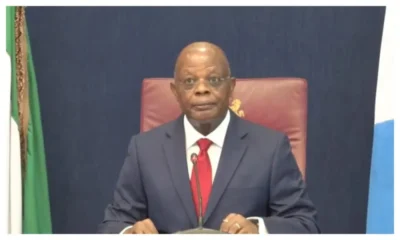

Despite criticism, Ibas swears in sole administrators for Rivers LGAs


Kano lawyer petitions Tinubu over ‘politically motivated’ police invitation of Emir Sanusi
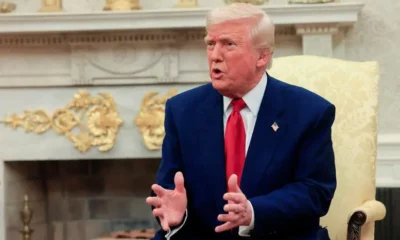

U.S withdraws military aid from Niger, redirects to Côte d’Ivoire, Benin, Ghana
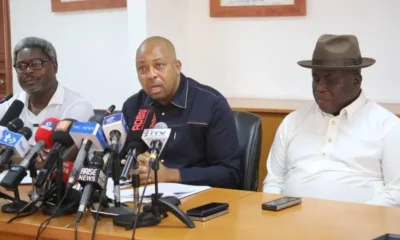

FCT Minister rolls out major land administration reforms, introduces strict timelines for allottees
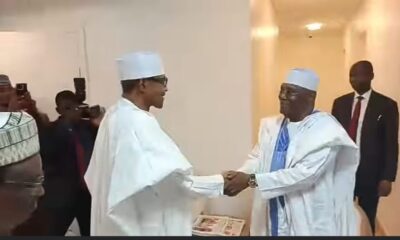

Atiku, El-Rufai, Tambuwal visit Buhari in Kaduna


Rivers govt debunks civil service recruitment announcement
Politics
Atiku, El-Rufai, Tambuwal visit Buhari in Kaduna
Published
1 hour agoon
April 11, 2025By
Ekwutos Blog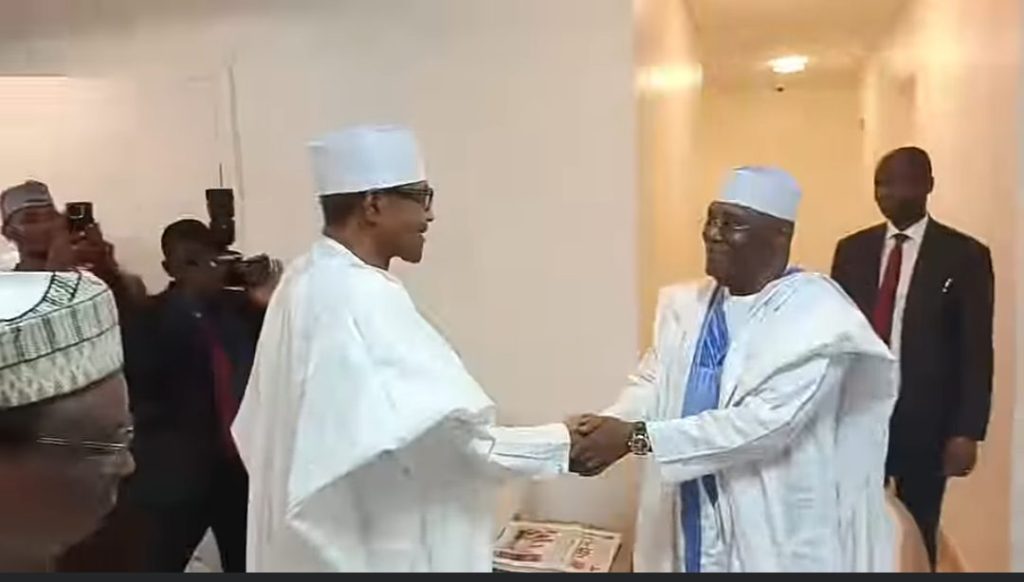
Former Vice President and 2023 PDP presidential candidate, Atiku Abubakar, has visited former President Muhammadu Buhari at his residence in Kaduna.
The visit, which also included former governors Aminu Waziri Tambuwal (Sokoto) and Nasir El-Rufa’i (Kaduna), was captured in a video sighted on the Facebook page of Atiku Abubakar.
Although the specific purpose of the visit was not disclosed, Atiku described it as a “post-Sallah visit.”
In the post, Atiku wrote, “As the Waziri Adamawa, I was obligated to be in Adamawa during the Sallah celebrations. I held forth for the Lamido Fombina (Adamawa) in some of the activities of the Sallah celebrations. Today, I had the opportunity to pay a post-Sallah visit to His Excellency, Muhammadu Buhari, President of the Federal Republic of Nigeria, 2015-2023. It was a wonderful time with him. As usual, he cracked me up (to the extent that my ribs were hurting) with his peculiar humour. -AA”
The visit comes after governors from the All Progressives Congress (APC) paid a similar visit to Buhari in Kaduna last week, amid growing speculation about political realignments and possible coalitions ahead of the 2027 elections.
Politics
Rivers govt debunks civil service recruitment announcement
Published
2 hours agoon
April 11, 2025By
Ekwutos Blog
Rivers State Government has refuted a widely circulated social media announcement alleging that the state’s Sole Administrator, retired Vice Admiral Ibok-Ete Ekwe Ibas, approved the recruitment of 10,000 “graduates and non-graduates” into the Rivers State civil service.
On Thursday, social media platform “Facebook”, was flooded with the purported government notice, which falsely claimed that the recruitment exercise had been sanctioned.
The statement was reported to have been signed by the Secretary to the State Government, Professor Ibibia Lucky Worika.
However, in a statement issued by Mrs. Inyingi S. I. Brown, Acting Head of the Rivers State Civil Service, the government described the information as entirely untrue and urged the public to disregard it.
The statement also clarified that any official communication on civil service recruitment would come from the Rivers State Civil Service Commission at the appropriate time.
The statement read, “The Office of the Administrator of Rivers State wishes to disclaim a purported Special Government Announcement spreading round on social media and other platforms stating that His Excellency, The Administrator of Rivers State, Vice Admiral (Rtd) Ibok-Ete Ekwe Ibas CFR, has approved the recruitment of 10,000 qualified graduates and non graduates into the Rivers State civil service and that the recruitment portal shall be opened for application midnight of Sunday 13/04/2025.
“The statement is claimed to have been signed by the Secretary to the State Government, Professor Ibibia Lucky Worika.
“We wish to categorically inform the people of Rivers State and the general public that this is false and ask that this fake announcement be ignored.
“Appropriate information will be released by the Rivers State Civil Service Commission in due time.”
Politics
APC Can’t Take Anambra Like Edo, Imo and Kogi— Gov Chukwuma Soludo
Published
9 hours agoon
April 11, 2025By
Ekwutos Blog
Governor Charles Soludo has dismissed the chances of the All Progressives Congress in the upcoming November 8 Anambra governorship election, declaring that the party lacks the grassroots presence needed to win in the state.
Soludo, who is seeking re-election under the All Progressives Grand Alliance, made the statement during an interview on Arise Television’s Prime Time.
The National Chairman of the ruling APC, Abdullahi Ganduje, had repeatedly stated that the APC had its eyes on southern states under the opposition control, such as Edo, Anambra, Osun and Oyo states.
But the governor stated that APC was able to prevail in states like kogi and imo because the incumbent governor’s got reelected, and they prevailed in Edo because they had grassroot structure.

Despite criticism, Ibas swears in sole administrators for Rivers LGAs

Kano lawyer petitions Tinubu over ‘politically motivated’ police invitation of Emir Sanusi

U.S withdraws military aid from Niger, redirects to Côte d’Ivoire, Benin, Ghana
Trending

 Trending6 months ago
Trending6 months agoNYA demands release of ‘abducted’ Imo chairman, preaches good governance
- Business6 months ago
US court acquits Air Peace boss, slams Mayfield $4000 fine

 Politics6 months ago
Politics6 months agoMexico’s new president causes concern just weeks before the US elections
- Entertainment6 months ago
Bobrisky transferred from Immigration to FCID, spends night behind bars
- Entertainment6 months ago
Bobrisky falls ill in police custody, rushed to hospital

 Politics6 months ago
Politics6 months agoRussia bans imports of agro-products from Kazakhstan after refusal to join BRICS

 Politics6 months ago
Politics6 months agoPutin invites 20 world leaders
- Politics1 year ago
Nigerian Senate passes Bill seeking the establishment of the South East Development Commission.

